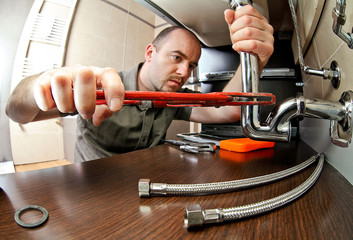A plumber is an expert in sewage, drainage, and potable water systems. He also installs water and sewage systems. These systems ensure that water, waste, and other materials are safely transported throughout a building. Plumbing services are essential for any residential or commercial building. Plumbers can help you choose the right system for your home or business.

Plumbing services vary depending on the size of the project. A plumber may install toilets, water heaters, dishwashers, and other fixtures. He may also troubleshoot malfunctioning pipe systems and repair worn parts. He must be patient and have strong manual dexterity. His work requires precision and attention to detail. A plumber must also be familiar with hydraulic systems and understand how they function. Plumbers also install, repair, and maintain septic systems.
In addition to technical skills, a plumber must have good communication skills. He must be able to understand the goals of a project and be able to explain his work to customers effectively. He must also be able to work well with other professionals in a team. Luckily, the job outlook for plumbers is good. According to the U.S. Bureau of Labor Statistics, plumber jobs are expected to grow 15% between 2016 and 2026. This is much faster than the average job growth in the construction industry.
There are many types of plumbers. Some specialize in new construction and home remodeling. A plumber working on a new home will have to install water pipes, faucets, and other fixtures that meet local, state, or federal codes. A plumber who specializes in plumbing systems is the best choice for this type of work. They can handle a variety of jobs from installing water and gas lines to solving plumbing emergencies.
Plumbing is a profession that originated in ancient Rome. During Roman times, lead was used for pipes, conduits, and baths. The word “plumum” means “lead.” Because lead is so flexible, it was the preferred material for water supply systems. Nowadays, plumbers use metal, steel, and plastic for their work. Besides water supply, plumbers also perform drainage work. Drainage work requires laying stormwater and sewage pipes.
Plumbing contractors deal with new construction, renovation, and remodeling. They often hold additional training and licenses and may work for larger plumbing companies. Many small plumbing companies are run by plumbers, but they may not have the experience, expertise, or expertise needed for more complex plumbing projects. Plumbing contractors are specialized plumbers who can provide services that other plumbers cannot.
Plumbing is a lucrative career that requires a certain level of education. An apprenticeship is a great way to learn the trade. Plumbing apprenticeships usually require 5 GCSEs (A* to C) and a strong practical skillset. The apprenticeship takes between two and four years. If you want to work in a construction environment, you can take additional training in building services, HVAC, or any other related field.
You can earn a license as a plumber if you complete an apprenticeship. To become a certified plumber, you can also take the Red Seal exam. This certification enables you to work in all provinces. However, it’s recommended to go through an apprenticeship, but it is not mandatory. Getting your certification is important for your career.
The most common route to become a plumber is to enter an apprenticeship program sponsored by a contractor or local union. These programs are typically four to five years long, and require 2,000 hours of on-the-job training. In addition to learning the ins and outs of plumbing, you’ll also need a high school diploma.
As a plumbing contractor, you’ll need to be certified by the Division of Labor. In addition to being certified, a plumber should also have strong mechanical skills, people skills, and knowledge of plumbing systems. Moreover, a plumber must also hold a contractor’s license. This license will help you to work on plumbing projects, such as installing new fixtures or plumbing systems. You can also become a master plumber by taking a state-sponsored exam.
If you’re building a new home or business, plumbing service is crucial. Plumbers are often the first service professionals homeowners call when a problem arises. They can handle problems with clogged drains, burst pipes, and toilet overflows. In addition to handling basic plumbing needs, plumbers can also act as consultants during the planning stage of a project. They can also help you comply with local building codes.